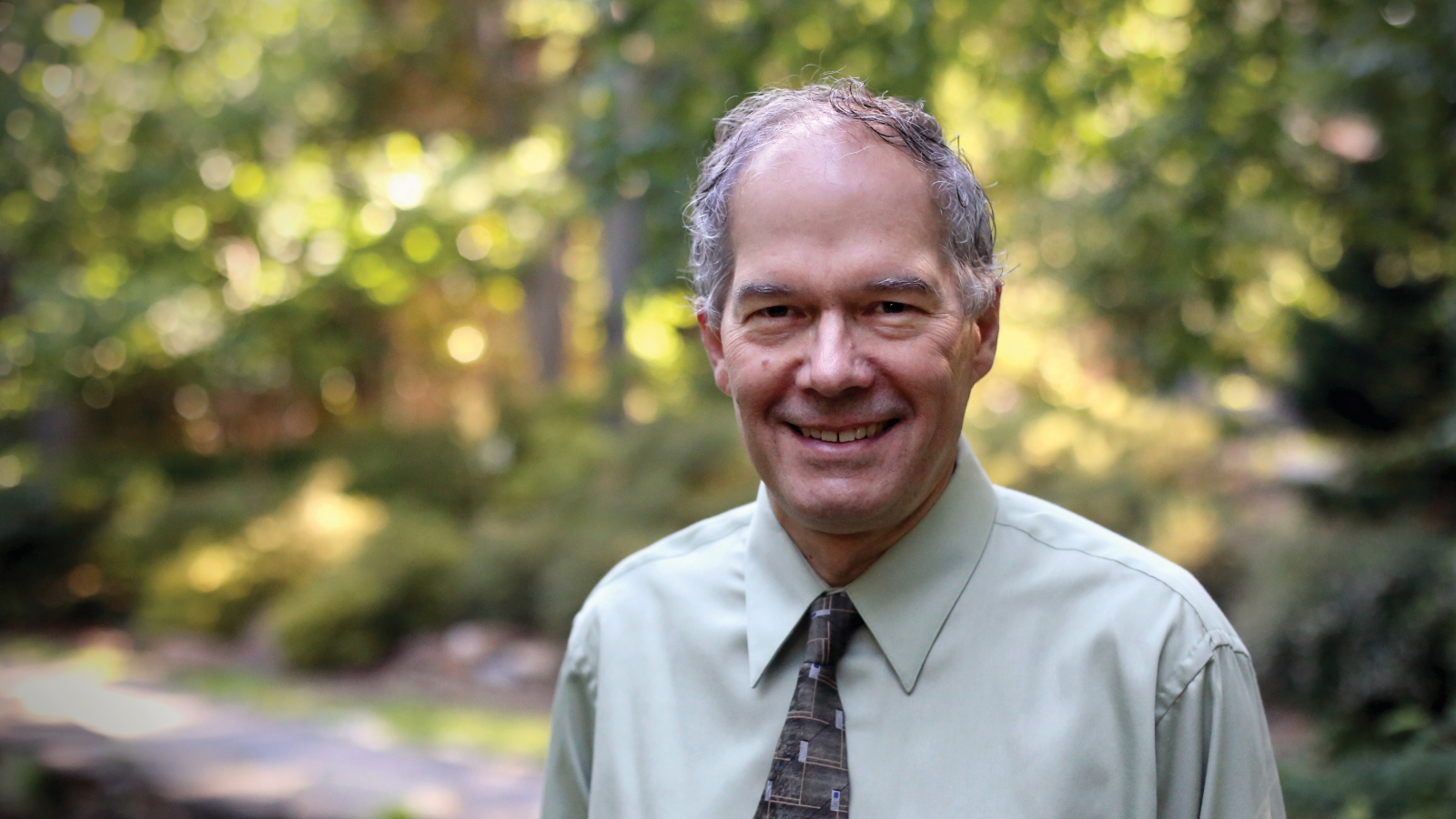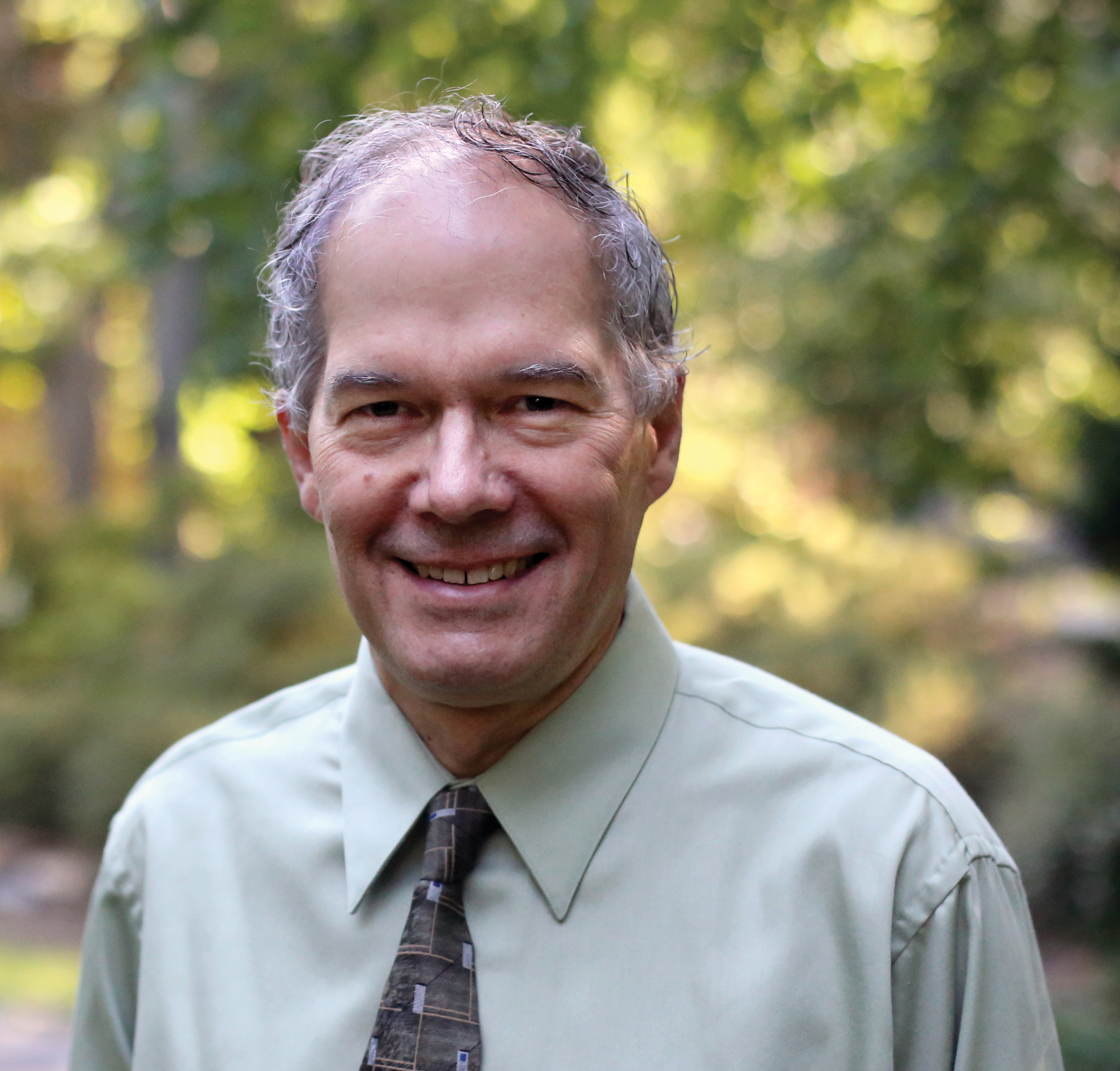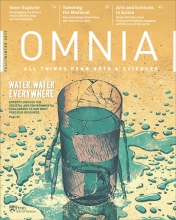Answering the Call
Paul Sniegowski, the newly appointed Stephen A. Levin Family Dean of the College of Arts and Sciences, riffs on research, teaching, and the liberal arts.

This past July, Paul Sniegowski, a professor of biology, was appointed the Stephen A. Levin Family Dean of the College of Arts and Sciences. As Dean of the College, Sniegowski will oversee undergraduate curricula as well as programs and students in all departments and non-departmental programs in Penn Arts and Sciences. He will also work with Steven J. Fluharty, Dean and Thomas S. Gates, Jr. Professor of Psychology, Pharmacology, and Neuroscience, on planning and priorities for undergraduate education.
Sniegowski is a recipient of the Ira H. Abrams Memorial Award for Distinguished Teaching in the College and has twice received the Department of Biology’s annual award for teaching excellence. Beyond the classroom and lab, he has maintained a strong commitment to undergraduate matters that includes several years of service as chair of the College’s Committee on Undergraduate Education. In addition, Sniegowski served on the Faculty Senate Committee on Students and Educational Policy, the faculty advisory boards of the College of Liberal and Professional Studies and the Center for Teaching and Learning, and chaired the Penn Arts and Sciences Teaching Awards Committee.
Sniegowski’s research on population and evolutionary genetics has been widely published in top journals.
We spoke with Sniegowski about his research career, his deeply-held beliefs on being an educator, and his views on the state of the liberal arts.
Q: What initially led you to your field of study?
My undergraduate background is actually in music. After high school, I went to the Indiana University School of Music and got a degree in violin performance. Around the end of my time in music school, I realized that I’d always been interested in biology and if I ever wanted to follow that interest I’d better give it a try. So I started taking basic science and math courses, first while pursuing my music degree and later while working as a freelance musician and music teacher. I wound up going to graduate school at Indiana University in biology.
There, I was a field biologist and studied the migration of a bird called the indigo bunting. I got more and more interested in evolution while I was doing this field biology. I pulled up stakes and went to the University of Chicago and that’s where I got my Ph.D. in population genetics.
Q: One of your key research interests is mutation. Can you talk about this phenomenon?
Genetic mutations are actually caused by a number of different phenomena, but for quite a few of them it makes sense to think of them as copying mistakes. There’s a molecular apparatus that copies the genome, like a scribe, and once in a while this apparatus makes “typos,” if you will.
We’re all mutants. The human mutation rate is sufficiently high that it’s likely that every newborn carries not just one new mutation compared to its parents, but tens of them. Many mutations make no difference to our well-being; among the ones that do make a difference, most are harmful and a few are beneficial. None of them gives us super powers, unfortunately!
My collaborators and I study mutation rates and their evolutionary implications primarily out of sheer curiosity, but understanding the nature of mutation rates also connects directly to an understanding of why large multi-celled organisms like ourselves develop diseases like cancer. Mutations can take away the controls that regulate cell division and then you get a rogue population of cells in the body that divides faster than it should, doesn’t play by the rules, takes up more resources, and sends out colonists—in other words, cancer.
"We’re all mutants… it's likely that every newborn carries not just one new mutation compared to its parents, but tens of them."
Q: You’ve been involved in educational activism, such as an open letter regarding the landmark 2005 court case Kitzmiller v. Dover concerning the teaching of intelligent design as an alternative to evolution in public high school classrooms. Can you discuss your role?
I have to give a lot of the credit for that letter to Penn Professor and Chair of Philosophy Michael Weisberg. Michael suggested that we get involved at the periphery, so we wrote an open letter from Penn to the Dover, Pennsylvania school board. The letter was signed by almost all of the natural sciences faculty in Penn Arts and Sciences.
Our letter pointed out that the intelligent design creationism that the Dover school board was instructing its teachers to present as an alternative to evolution was unscientific and would put Dover High School students at an educational disadvantage. The Dover teachers themselves knew this and had written their own strongly worded letter refusing to present intelligent design.
I don’t think that our Penn letter had an influence on the outcome of the Dover case (which was that the school board’s policy was overturned because it violated the establishment clause of the First Amendment of the U.S. Constitution), but it did get the attention of the school board’s lawyers, who sent Michael Weisberg and me a rather nasty letter that I still have. Michael and I subsequently also did a Penn Science Café presentation on creationism and evolution together.
In discussing and teaching evolution with students and acquaintances, I try always to maintain a patient, non-confrontational attitude. I firmly believe that progress is most likely to come through calm, reasoned dialogue.
Q: What draws you to undergraduate teaching?
I come from a family of teachers. My father is a retired English professor, and both my sister and brother teach high school English. Teaching has always been central to dinner table conversations where we would all get together; it is something that should be done responsibly and with your whole heart. To be honest, I can’t remember a time when I was not aware of the vital importance of teaching as a calling and the central role of teaching in human society.
Q: You’ve had a seat on faculty advisory boards, and you’ve won prestigious teaching awards. What have these experiences taught you about the culture of the University?
Teaching is greatly valued here. At the same time, Penn is a high-powered research institution where significant original work is rightly valued. This puts a lot of pressure on our young faculty. One of the ways we try to help with this is by having tenured faculty members serve as mentors for young faculty to help them understand how to balance the demands of teaching and research and find complementarity between them. For example, I think many faculty will tell you that a good day in the classroom can really encourage them in their other efforts here. Teaching can be inspiring, both to the student and the teacher.
The fun of being on teaching award committees has been to see, firsthand, that balance and complementarity between teaching and research are achievable. It’s a little analogous to when I went to music school and saw the top end of musical ability; I had no idea people could be that good! We see that on campus too, with the best of our teachers and researchers.
Q: Can you discuss some of the key challenges the liberal arts face today?
I think many of the challenges are perceived rather than real. There have been a number of surveys of chief executive officers who say that the very skills that are taught in a liberal arts degree are what they look for in hiring people: critical thinking, flexibility, adaptability, the ability to see different perspectives.
The liberal arts are what, in the deepest sense, make us human. They are what we developed along the path in time from our common evolutionary ancestor with apes to today’s human societies and cultures; they are our collective future as well. At our best as humans, we strive to understand each other: That’s what the liberal arts are about.
"If you think about the University of Pennsylvania as an organism, I believe the College of Arts and Sciences is its beating heart."
Q: How might you tackle misperceptions about the liberal arts?
The need in society for flexible minds and critical thinking skills has never been more evident. These things are exactly what the liberal arts teach, and I think those of us who advocate for the liberal arts could perhaps point this out even more forcefully. But at a broader level, we also have to emphasize the central and inspiring role of arts and sciences in humanity’s ongoing quest to understand ourselves, our world, and our universe.
Q: How do you anticipate spending your first year as dean?
I can’t see how I can serve as the College dean without also keeping my hand in teaching, so I plan to continue some teaching as long I am dean, beginning this year. Then there is the larger role: The College dean is in some sense the standard bearer for the undergraduate liberal arts here at Penn.
I see the College as a wonderful, nurturing liberal arts college embedded within a great research university. To use a biological analogy: If you think about the University of Pennsylvania as an organism, I believe the College of Arts and Sciences is its beating heart. Our distinction from the great small liberal arts colleges around this country is the direct access to research opportunities that we offer our students. And so I want to continue to explore ways of making that access easier even than it already is.
Q: What unique opportunities does a liberal arts education provide?
I think where the liberal arts education goes from being fulfilling to being transformative and inspiring is when students get to the point in their education where they say, “Wow, what’s further on from here is not in books, it’s not in journals, it’s not on the Internet—it’s not even known. How do I go there?” This is where our faculty—who are themselves world-class researchers—can help point the way by guiding students into research.
I know from my own life as a teacher and a student that such research experience gives students a tremendous new respect for how precious human knowledge and culture really are. And so I really want us to find ways to take even more students, from all backgrounds, to the edge of what is known, and beyond, and encourage them to make new knowledge and create new art from a multiplicity of perspectives. This is how the liberal arts enrich life for all of us.





